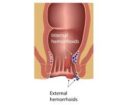Hemorrhoids, also known as piles, are swollen veins in the lower rectum and anus that can cause discomfort and pain. Identifying signs and symptoms of hemorrhoids typically involves recognizing various physical manifestations and related discomforts. Here are some common signs and symptoms of hemorrhoids:
- Rectal Bleeding: One of the most common symptoms of hemorrhoids is rectal bleeding. This bleeding may be noticed on toilet paper after wiping, in the toilet bowl after a bowel movement, or as blood streaks on stool. The blood may be bright red or darker in color.
- Anal Itching or Irritation: Hemorrhoids can cause itching and irritation in the anal region, often due to the presence of mucus or stool residue around the swollen veins.
- Pain or Discomfort: Hemorrhoids may cause pain or discomfort, especially during bowel movements or while sitting for extended periods. The pain may be mild to severe, depending on the size and location of the hemorrhoids.
- Swelling or Lump: External hemorrhoids, which develop under the skin around the anus, may be felt as a swelling or lump near the anal opening. This lump may be sensitive to touch and may cause discomfort or pain.
- Anal Leakage: Hemorrhoids can lead to leakage of mucus or stool from the anus, which can cause discomfort and irritation.
- Difficulty Cleaning After Bowel Movements: Hemorrhoids can make it difficult to clean the anal area thoroughly after bowel movements, leading to a feeling of incomplete evacuation or cleanliness.
- Prolapse: In severe cases, internal hemorrhoids may protrude from the anus during bowel movements and then retract back inside. This is known as hemorrhoid prolapse and can cause significant discomfort.
- Thrombosis: Sometimes, blood clots can form within external hemorrhoids, causing severe pain, swelling, and inflammation. This condition is known as thrombosed external hemorrhoids.
If you experience any of these signs or symptoms of hemorrhoids, it’s essential to consult a healthcare professional for proper diagnosis and treatment. While hemorrhoids are usually not a serious medical condition, they can cause discomfort and may require treatment to alleviate symptoms and prevent complications. Your doctor can recommend appropriate treatments based on the severity and nature of your hemorrhoids, which may include lifestyle modifications, over-the-counter remedies, prescription medications, or procedures such as rubber band ligation or surgery.



